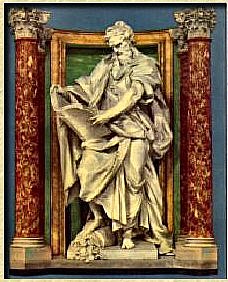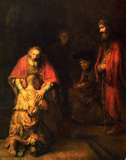Genesis - "In the beginning" Part III

As we discussed last time , Adam's sin was his failure to protect his wife Eve. Following the first sin, Adam and Eve are banished from the Garden. Barely had man transgressed, however, when God warns the serpent: "I will put enmity between you and the woman, and between your offspring and hers; He will strike at your head, while you strike at his heel." (Genesis 3:15) This is the Protoevangelium or “first gospel” in which God promises to send a redeemer to save his people from the slavery of sin. The "woman" is the Blessed Virgin Mary. Her "offspring," (sometimes translated as seed), is Jesus Christ. He (Christ) will strike and ultimately defeat the serpent/evil. The forces of evil will attack Christ culminating in His passion and death. Fortunately for us, Christ is Resurrected, defeating death and overcoming sin. His victory is our victory. His Resurrection is our hope and our salvation.



